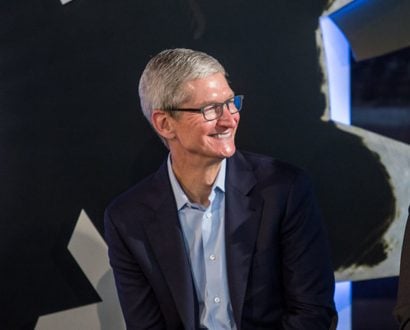Apple buys three to four businesses a month

Apple, the third largest global company by market capitalisation, buys a business every three to four weeks, CEO Tim Cook told a virtual annual shareholder meeting.
Cook said the multinational technology company had bought about 100 companies over the past six years, which equates to one every three to four weeks. Its business philosophy has always been to acquire small companies that can be integrated into existing company projects.
Last year, Apple bought edge-based artificial intelligence startup Xnor.ai for around US$200 million, according to GeekWire. The Seattle-based startup builds low-power machine learning technology that operates continuously without requiring a connection to the cloud.
Apple then bought Irish AI speech recognition startup Voysis, which adapted the WaveNet system for synthesising human speech first created by Google in 2016 to generate voices but by using far less memory, according to Voicebot.ai.
In March last year, it was announced Apple had purchased weather app DarkSky, which was well-known in the US, UK and Ireland where it operated. It appeared that features of DarkSky had been implemented into the US-only IOS 14's weather app, The Verge reported.
The company then spent about US$100 million on another startup, Newport Beach, California-based virtual reality company NextVR, Apple confirmed to Bloomberg. NextVR records live events like sports, music and entertainment that are to be experienced in VR. The technology company's next US$100 million capture was Canadian startup Mobeewave, which specialises in letting shoppers use their smartphones to access a credit card and process payments via an app.
In June last year, the company that creates, makes and sells consumer electronics, computer software, and online services bought startup Fleetsmith, a small device management vendor. Apple has integrated Fleetsmith into its services. "Fleetsmith is a mobile device management solution for administrators needing to manage fleets of Apple devices. The goal is to make powerful, secure fleet management available to organisations of all sizes. With it, you can automate device setup, intelligence, patching and security for your devices," Apple said.
Apple also bought machine learning startup Inductiv Inc, which was co-founded by professors from Stanford University, the University of Waterloo and the University of Wisconsin. Inductiv developed technology that uses AI to automate the task of identifying and correcting errors in data. Clean data is important for machine learning, a popular and powerful type of AI that helps software improve with less human invention.
Apple also purchased Spaces, a developer of location-based VR experiences that added a VR extension for videoconferencing platforms like Zoom and Skype, Protocol reported. Spaces, founded in 2016 by two former DreamWorks Animation executives, created several location-based VR experiences installed at theme parks and theatres, including multiplayer game Terminator Salvation: Fight for the Future. During the coronavirus pandemic, Spaces launched a new VR extension for videoconferences that created real-time animated virtual avatars of speakers for meetings and presentations.
Apple then laid out more money for Scout FM, a podcast app for iOS, Android and Alexa that used AI and users' listening history to create podcast stations, making it similar to listening to a radio station. Apple immediately shut down Scout FM and is likely integrating the technology of Scout FM into its own software.
If the idea of buying a business every month seems excessive, remember Apple announced a record high of revenue in the first-quarter of its fiscal year 2021, taking US$111.4 billion revenue. The multinational company is worth more than US$2 trillion.
Cook told the shareholders meeting that the purchases are mostly aimed at acquiring technology and talent.
Apple's largest acquisition in the last decade was its US$3 billion purchase of Beats Electronics, the headphone maker founded by rapper and producer Dr Dre.
Measured by value, Apple’s purchases are far smaller than those of many of its tech rivals.
Microsoft paid US$26 billion for LinkedIn, Amazon paid US$13.7 billion for Whole Foods, and Facebook paid US$19 billion for WhatsApp.